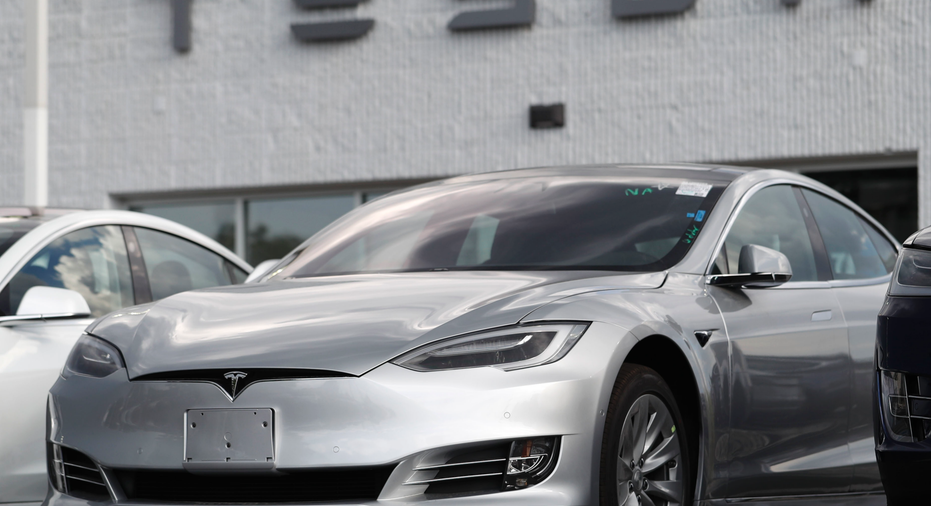Tesla's bad news accelerates as Wall Street loses faith

Late last year, Tesla Inc. was fully charged and cruising down the highway on Autopilot.
Shares were trading above $370 each, sales of the Model 3 small electric car were strong and the company had appointed a new board chair to rein in the antics of sometimes impulsive CEO Elon Musk.
But around the middle of December, investors started having doubts about the former Wall Street darling's prospects for continued growth, and the stock started a gyrating fall that was among the worst in company history.
For the year, the share price is down around 40%, largely on concerns Tesla is running out of buyers for its vehicles, which range in price from a base $35,400 Model 3 to a larger Model X SUV that can run well over $130,000.
Morgan Stanley analyst Adam Jonas, on a private call with investors this week, raised the possibility that Tesla would have to be restructured due to rising debt and falling sales. A leaked memo to employees from Musk that said sales were up stanched the stock's bleeding, and no one is really certain about what's next.
Here's a look at what has happened and what might be in the future for the electric car and solar panel company:
____
WHEN DID TESLA'S STOCK START FALLING AND WHY?
A downhill snowball of bad news eclipsed anything good Tesla did, and raised investor doubt about whether there are enough buyers left who want and can afford Tesla vehicles. Throw in a little bit of erratic behavior from Musk as well.
Just before Tesla stock hit a late-year peak on Dec. 13, Musk did a weekend interview with CBS' 60 Minutes that escalated a spat with securities regulators over his tweeting out company information. This time, he said it was unrealistic to think Tesla's new chairwoman could control his behavior because he's the largest shareholder. It came after Musk and Tesla each paid $20 million in fines in an October settlement with the U.S. Securities and Exchange Commission over ill-advised tweets.
____
WHAT ELSE HAPPENED?
Just after the new year began, Tesla announced record fourth quarter sales that fell short of Wall Street expectations. The company also cut prices by $2,000 per vehicle to offset the phase-out of a $7,500 federal tax credit for Tesla. That increased doubts about future sales. Then Tesla eked out a small fourth-quarter profit that also disappointed investors.
The snowball picked up momentum in February when Musk announced he would close most company stores and fill orders online. He also walked back his prediction of sustained quarterly profits, predicting a first quarter loss. When January-through-March sales figures came out, investors were disappointed again. The company had only 63,000 deliveries, down 31% from the fourth quarter.
Musk later introduced the Model Y midsize SUV, but gave few details. Investors were nonplussed. Then came a conference call to announce fully self-driving cars by sometime next year, an announcement widely criticized by experts as unrealistic. The stock slump continued. With sales down, Tesla posted a larger-than-expected $702 million first-quarter loss in April, and Musk warned it wouldn't be profitable in the second quarter either.
In May, Tesla sold stock and notes that yielded $2.3 billion, increasing debt. Along the way, the SEC asked a judge to find Musk in contempt for tweets about vehicle production, a spat that was later settled. Also throw in reports of a leaked email last week from Musk to employees saying at the current cash burn rate, Tesla would go broke in 10 months.
____
WHAT HAPPENS NEXT?
It all depends on whether Tesla can produce enough cars at its Fremont, California, factory and whether people keep buying them. Musk's memo from Wednesday said the company has 50,000 net new orders this quarter and it could pass record deliveries of more than 90,000 in the fourth quarter of last year. That could generate enough cash to reverse the company's fortunes. But many analysts are skeptical. Morgan Stanley's Jonas didn't think sales would be that strong.
"We see shares continuing to trade lower on a lack of near-term catalysts and likely cut to vehicle sales guidance," CFRA analyst Garrett Nelson wrote in a note to investors Thursday. He cut his one-year stock price target $50 to $150.
Senior Analyst Jessica Caldwell of Edmunds, which provides content to The Associated Press, said Tesla has an uphill climb.
"There doesn't appear to be anything in the (product) pipeline that is going to save them," she said. "Now Tesla seems to be losing the confidence of its biggest cheerleader, Wall Street."
____
Follow Tom Krisher on Twitter at https://twitter.com/tkrisher



















